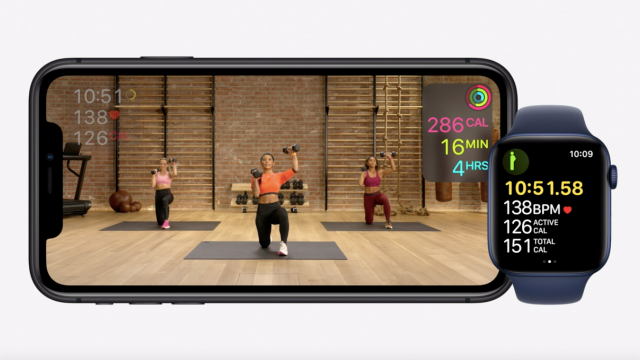Just hours after the reveal of Apple’s new services bundles, the tech giant has already taken criticism for evidently favouring its own apps over those with which it directly competes in its App Store.
Apple’s long-rumoured push into services bundles comes as little surprise for a number of reasons. One is that some of Apple’s services have been more successful than others — ahem, Apple TV+ — and bundles allow Apple to lure some paying customers who might otherwise overlook an Apple service on its own. Another reason is that ensnaring users who are using an Apple app out of convenience rather than because it’s the best app in its category obviously benefits Apple. A user who is already subscribed to Apple Fitness+ or Apple Music as part of Apple One may be less inclined to pay for Fitbit Coach or Tidal, for example.
This fact has not been lost on app makers. Spotify, which has been feuding with the tech giant for years now over its hefty App Store fees, quickly seized on the opportunity to raise Apple antitrust concerns. Recode Media host Peter Kafka obtained a statement from a spokesperson for the Spotify claiming that Apple was “using its dominant position and unfair practices to disadvantage competitors and deprive consumers by favouring its own services.” The statement further called Apple’s actions “anti-competitive” and implored antitrust authorities to intervene.
Spotify, via PR, says Apple bundle that combines music with other services helps make Spotify’s antitrust case, and “threatens our collective freedoms to listen, learn, create, and connect.” pic.twitter.com/62KjsEwJ2i
— Peter Kafka (@pkafka) September 15, 2020
Meanwhile, Peloton CEO John Foley let on during an investors’ meeting on Tuesday that the company was “digesting the announcement.” While he spoke highly of Apple’s commitment to the fitness category, he also appeared to insinuate that without dedicated workout hardware, Peloton still had a leg up on Fitness+.
“They’re just going to be the content,” Foley said. “And we think the special sauce, the magic, is our connected platforms and in order to work out at home you need a stationary bike if you’re going to be biking, you need a treadmill if you’re going to be running.”
Setting aside for a moment the fact that nobody actually needs a treadmill to run or even equipment to exercise, Peloton seems to be missing the fact that it will be competing against Fitness+ for subscribers.
Particularly if Fitness+ is as good as many of us likely anticipate it will be, there’s no reason to believe a would-be Peloton customer wouldn’t forego the company’s pricey equipment to instead focus on an app they’re already paying for through Apple One. Plus, what’s included in Fitness+ is yet to be seen, but promotional materials during Apple’s event today appeared to indicate that indoor cycling would be included. What’s to stop someone from buying their own — presumably far more affordable — stationary bike and deferring to Apple’s instructors? It certainly helps that Apple’s pricing for many of its apps, but especially Fitness+, often undercuts the subscription costs of its service competitors.
Apple’s throwing its weight behind competitive pricing, quality development, and usability via its existing Apple ecosystem. If app makers aren’t already terrified, they should be.
